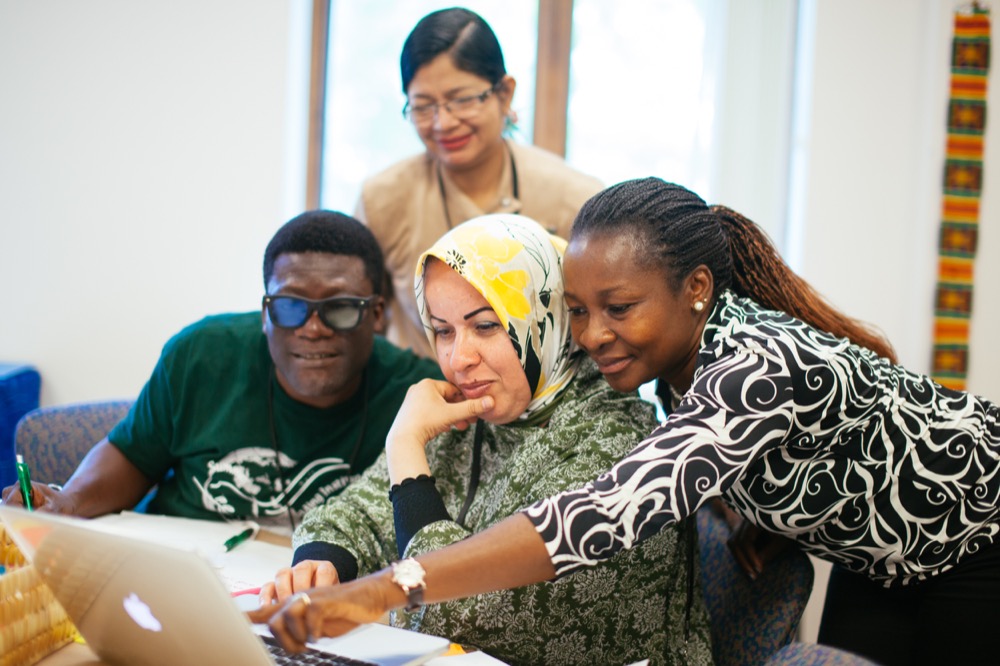Participation in marches and protests alone does not adequately address the complexities and shifting natures of national and societal challenges. It is a good first step to become interested in a cause, but those challenges require constantly evolving, innovative responses – using skills such as those taught during the Summer Peacebuilding Institute (SPI) at Eastern Mennonite University’s Center for Justice and Peacebuilding (CJP).
Seven new courses this year are added to SPI’s core offerings. Since 1994, more than 3,200 people from 120 countries have attended the summer program, gaining concrete strategies and practical skills.
“We live in an era fraught with injustice and conflict,” said SPI director Bill Goldberg. “Knowing how to proactively respond can open avenues of transformation.”

“Peacebuilding takes work,” he added. “And to do work well, you need the right tools – sometimes revisioning of the same tools, and sometimes brand new ones.”
During its four sessions in May and June, academically credentialed practitioners teach five- and seven-day courses that can be taken for personal skills growth and training or academic credit. Participants also share wisdom and knowledge and meals with each other and take time for rest, reflection and renewal.
This year, SPI will offer an array of new courses: topics include the prison-industrial complex, changing the narrative of sexual harms, human-centered design, visual communication and nonviolence, and more.
A fifth session of three-day workshops is being offered to give those unable to spend an entire week or more an opportunity to gain skills and knowledge. Workshops being considered for this special three-day workshop series include topics such as theater for activists, integration of conflict systems, the role of crime victims and survivors in restorative justice, and a training for facilitators who help children respond effectively to violence and abuse. More information will be available in the coming weeks on the SPI website and facebook page or by contacting the Summer Peacebuilding Institute at spi@emu.edu.

Course instructors include CJP faculty as well as a variety of global practitioners with extensive peacebuilding experience and insight. Some of them are:
- Ram Bhagat (co-teaching “STAR Level 1” with neuropsychologist Dr. Donna Minter ) is an educator, arts innovator, and peacemaker. He is an international conflict resolution trainer for the Richmond Peace Education Center; the visionary behind the Richmond Youth Peace Project; board president for theater arts-based group The Conciliation Project; and co-founder of Drums No Guns.
- Ed Brantmeier (“Peace Education”) is an educator, author, contemplative practitioner, and martial artist. He has lived and/or worked as an educator in various k-12, university, and community contexts in multiple countries: United States, India, Nepal, Philippines, Thailand, Cyprus, Fiji, Australia, New Zealand, and more.
- Monti Datta (“Modern Slavery and the Prison-Industrial Complex”) is a professor of political science at the University of Richmond, a co-developer of the Global Slavery Index and a consultant and researcher on human trafficking.
- Fania Davis (“Truth-telling, Racial Healing and Restorative Justice”) is the co-founder and executive director of Restorative Justice for Oakland Youth. Since 2003 she has been engaged in a search for healing alternatives to adversarial justice. She has taught restorative justice at San Francisco’s New College Law School.
- Kevin Hamilton (“Peace Through Pictures: Visual Communication and Nonviolence”) is an artist and scholar who has published on subjects including histories of technology and society and perception of bias in algorithmic systems. His book Lookout America!, a critical history of nuclear test films, will be out this fall.
SPI has spawned a number of initiatives around the world from Canada to Ghana to India to Fiji to South Korea and beyond.
